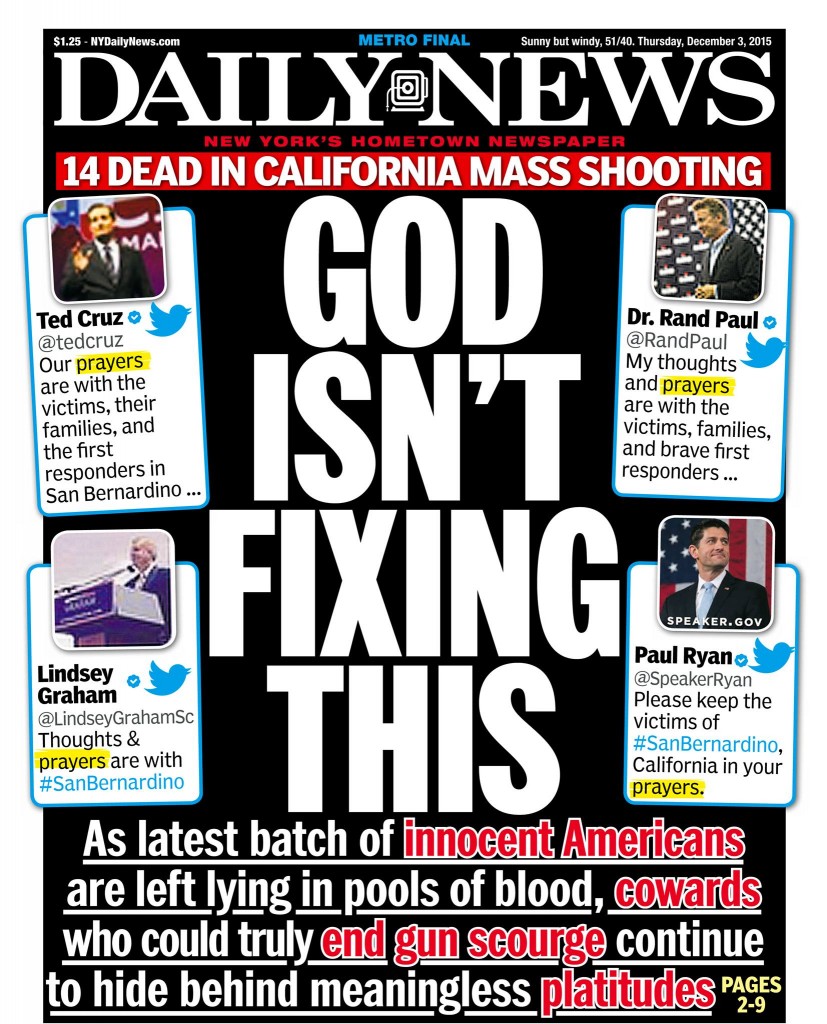What is the thoughtful and necessary reaction in the wake of yet another deadly attack on innocents? For many, it is to pray, and for many of those, to share their “thoughts and prayers” publicly. Shortly after yesterday’s horrific attack in San Bernardino, California, anger at the often repeated calls for thoughts and prayers began to surface on social media.
From the Huffington Post:
In short, basically anyone with a Twitter account shared thoughts and prayers in the immediate aftermath of the latest shooting. Which is kind of them to do, of course, but probably not enough to stop the next one.
The Washington Post has a round-up of one particular port in the Twitter storm:
Igor Volsky, who is the director of video and an editor at the left-leaning media outlet Think Progress, seized the opportunity, first by criticizing politicians for not supporting stricter gun legislation and instead offering only words of support, then by calling politicians out by responding to their sympathetic tweets with details about the money their campaigns have received from the NRA.
The Atlantic calls this reaction “prayer shaming,” and sees a decidedly partisan political edge to the anger:
There’s a clear claim being made here, and one with an edge: Democrats care about doing something and taking action while Republicans waste time offering meaningless prayers. These two reactions, policy-making and praying, are portrayed as mutually exclusive, coming from totally contrasting worldviews. Elsewhere on Twitter, full-on prayer shaming set in: Anger about the shooting was turned not toward the perpetrator or perpetrators, whose identities are still unknown, but at those who offered their prayers.
Adding:
This cynicism offers a view into just how much religion and politics have changed in the United States. Prayer and political action have a deeply entwined history in America. From civil rights to women’s suffrage, nearly every social-justice movement has had strong supporters from religious communities—U.S. history is littered with images like the one of pastors and rabbis marching on Selma, side by side with political activists.
After last week’s attack on a Planned Parenthood clinic, President Obama tackled the issue of prayer and political action head-on:
On Saturday, he said Americans could not “offer up our thoughts and prayers” for the families of the dead police officer and of the two other victims of the shooting “with a truly clean conscience” unless they also pushed for changes to make it harder to get guns.
He added a blessing for the dead at the end of his remarks.
Episcopalians Against Gun Violence offers this via Facebook:
Bishop Stephen Lane of the Episcopal Diocese of Maine offers a litany for the Gun Violence Sabbath. In the wake of the shootings in Colorado Springs, Savannah and San Bernardino, you might find it helpful right now.
From that Litany:
God of Justice, help us, your church, find our voice. Empower us to change this broken world and to protest the needless deaths caused by gun violence. Give us power to rise above our fear that nothing can be done and grant us the conviction to advocate for change.
For your dream of love and harmony, Loving God,
Make us instruments of your peace.
The Guardian reports that there have been 1052 mass shootings in the United States in 1066 days, that is, since the beginning of 2013- mass shootings being defined as four or more people shot in one incident. There have been more than 350, that is, more than one a day, so far this year. Yesterday, as events were still unfolding inside the Inland Regional Center, the paper reported on a text sent from a woman inside the building to her father:
“Shooting at my workplace. People shot. In the office waiting for cops.
Pray for us.”
Picture: New York Daily News front page, December 3rd, 2015

